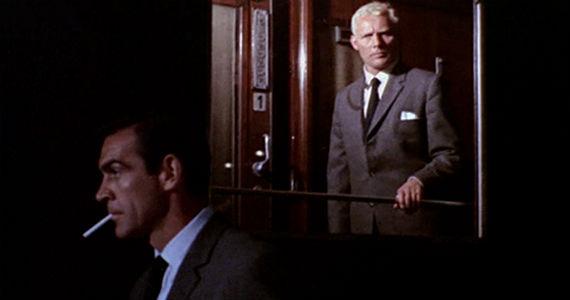Our Licence To Watch project continues with From Russia With Love (also known as The One With The Train Fight).
Like Dr.No, From Russia With Love is one of the Bond films that I first watched relatively late. As such it’s a film I’d only seen once prior to Licence To Watch and my overriding memory of it was the classic fight on the train between Grant and Bond near the end. Coming out of this second viewing I’m left with two main impressions:
- It’s slow, slow, slow
- It’s a pretty fleshy film!
It’s that with From Russia With Love they haven’t quite nailed the Bond formula; in fact, I’d go as far to say that Dr.No came closer to the classic formula. With From Russia To Love, for example, Bond still has his girlfriend (blink and you’ll almost miss her at the start of the film). Like Dr.No we stick largely to the one location, Istanbul, but we don’t have a secret base; we don’t have a showdown with the main villian (Grant is just a henchman) and we don’t have anything of consequence blowing up.
I enjoyed the slow pace of Dr.No, so didn’t mind that From Russia With Love was similarly languid in parts, and I don’t have any major quarrels with the plot of this second outing but it did seem at times that the film was simply treading water until such a time as Grant could have his shot at Bond.
It helps that we have a very charismatic cast. Kerim Bey is always a pleasure and offers just enough shadowing that you’re not entirely sure whether you can trust him (I was shocked to learn that the actor committed suicide after completing this role). Rosa Klebb is a brilliant, and brilliantly atypical villain (who clearly provides one of the character templates for the Austin Powers films). Sean Connery once again demonstrates why he was the perfect choice to bring Bond to the screen and it’s great seeing the first appearance of Q as we know and love him, played by Desmond Llewelyn.

But of course it’s Robert Shaw who steals the film, providing a chillingly understated performance: not even cold; simply unemotional and single-minded. We genuinely believe this is a man who is not only in control, but could quite easily despatch Bond and make it all seem like it’s just another day’s work. While I grumble about the pacing, keeping Bond and Grant away from each other for the bulk of the film is one of the screenplay’s sharpest moves: it increases the anticipation until we’re almost killing ourselves watching the seemingly unwitting Bond chat amiably away with Grant as he does his best chipper English secret agent act. It’s the contrast between Grant’s normal personality and this overly cheerful, almost submissive persona that makes these scenes so compelling.
The final confrontation almost makes the wait worthwhile as the two square off in a train carriage that’s scarcely larger than a coffin. It’s perhaps the one part of the film that could be seamlessly slotted into one of today’s action films: taut, heart-stopping and efficiently edited. Naturally, it’s here that Grant makes his one mistake: for all his ruthlessness he will still stop and talk, not to mention allow himself to be distracted by money. Bond, for all his charm, makes no such mistake: once he has his chance to do away with Grant he doesn’t hesitate.
I also mentioned that this was a very fleshy film. Admittedly we’re talking 1960s standards here, but it seems like for the first 30 minutes of the film almost everyone is getting busy taking their clothes off. We see Bond and his girlfriend in their underwear (of course); shortly after we see Grant sunbathing joined by a masseuse who carefully takes the time to strip down to her bikini before getting to work. I guess we should be grateful that everyone suits up before we find out that M has declared it a Full Dress Optional day at HQ.
Anyway, that was From Russia With Love. Still an excellent film for many reasons, but perhaps not quite the unmitigated classic I’d remembered it as. Next up is Goldfinger: the one where, most would argue, the ‘Bond film’ really found its feet.
